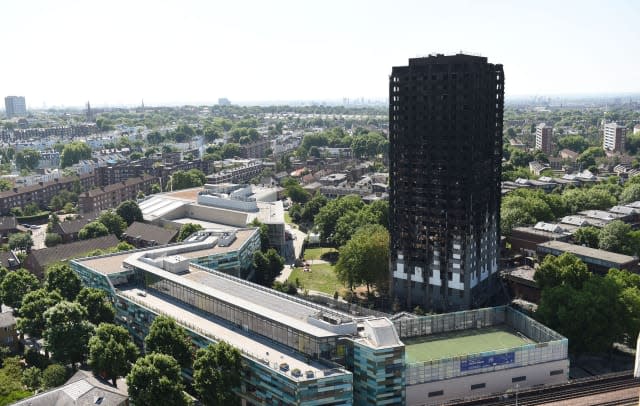Grenfell fire chiefs had no safe alternative to stay put strategy, inquiry told

Fire commanders marshalling the battle against the Grenfell Tower inferno had "no obvious and safe alternative strategy" than telling residents to stay put, an inquiry has heard.
The London Fire Brigade (LFB) has been criticised for the length of time taken to abandon the policy - nearly two hours after the blaze was first reported - despite flames reaching every floor.
On the final day of opening statements at the inquiry into the disaster, The Fire Brigades Union (FBU) said both commanders and firefighters were left in an "impossible situation".
The refurbishment of the building has seen material installed that made it a "highly combustible death trap", which the brigade lacked training and procedures to tackle, the union said.

Fire safety advice within tall buildings is set by the building owners, not the fire service, meaning it accords with the design specifications and escape capabilities.
Stephen Walsh QC, representing the LFB, told the inquiry: "It is a fundamental misunderstanding of the events of the fire and of fire service capability to assume the building's stay-put policy can be changed to a simultaneous evacuation at the stroke of a fire incident commander at whatever time.
"If there is no policy applied by the building owner which provides for a policy of simultaneous evacuation and there are no evacuation plans and there are no general fire alarms - what is an incident commander on the fireground to do?"
Martin Seaward, for the FBU, used his opening statement to ask "what alternative strategy might have been implemented" in the fast-moving situation.
He said: "There remains no obvious and safe alternative strategy nor detailed plan."

Both call operators and firefighters on the scene still suffer from the physical and emotional repercussions of responding to the disaster, he said.
The command centre was swamped with more calls seeking survival guidance than in the previous 10 years for the whole of London combined, the inquiry heard.
Dozens of firefighters are expected to give evidence at the probe, leading the LFB lawyer to warn chairman Sir Martin Moore-Bick of their potentially fragile state of mind.
Martin Seaward, representing the FBU, questioned whether, given "multiple" safety failings within the building, "the firefighters were always chasing a sinister fire they had no realistic chance of defeating".
He said Sir Martin should consider whether early incident commanders had training and procedures on issues such as tackling cladding fires, looking out for signs of a breach of compartmentation and when to abandon a stay-put policy.

"We submit on the evidence so far that there were no such procedures, nor had firefighters received any such training."
He added of the challenges faced that night: "The FBU invites you to consider whether the firefighters were put in an impossible situation."
It was heard many rescuers faced tough choices which had "serious consequences" regardless of the outcome.
Mr Walsh QC said: "The LFB believes the scale, the sheer scale, of failures at Grenfell Tower and sheer scale of the fire that resulted from them was a combination of factors that, taken together, created a unique and unprecedented set of challenges for the fire service nationally."
Both the LFB and the FBU flatly denied claims made on Tuesday that firefighters could have been guilty of unconscious racism as they tackled the blaze.
The claim was made by lawyer for bereaved and survivors Imran Khan QC, who cited the "stereotypes" used in firefighters' descriptions of residents from black or minority backgrounds.
The openings concluded at Holborn Bars in central London on Thursday.


